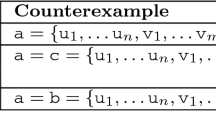Abstract
In this paper we present a new approach to a symbolic treatment of quantified statements having the following form “Q A's are B's”, knowing that A and B are labels denoting sets, and Q is a linguistic quantifier interpreted as a proportion evaluated in a qualitative way. Our model can be viewed as a symbolic generalization of statistical conditional probability notions as well as a symbolic generalization of the classical probabilistic operators. Our approach is founded on a symbolic finite M-valued logic in which the graduation scale of M symbolic quantifiers is translated in terms of truth degrees. Moreover, we propose symbolic inference rules allowing us to manage quantified statements.
Similar content being viewed by others
References
E. Adams, The Logic of Conditionals (Reidel, Dordercht, 1975).
H. Akdag, M. De Glas and D. Pacholczyk, A qualitative theory of uncertainty, Fundamenta Informatica 17(4) (1992) 333-362.
F. Bacchus, Representation and Reasoning with Probabilistic Knowledge (MIT Press, Cambridge, MA, 1990).
F. Bacchus, A.J. Grove, J.Y. Halpern and D. Koller, From statistical knowledge bases to degrees of belief, Artificial Intelligence 87 (1997) 75-143.
P. Cheeseman, An inquiry into computer understanding, Computational Intelligence 4(1) (1988) 58-66.
D. Dubois and H. Prade, On fuzzy syllogisms, Computational Intelligence 4(2) (1988) 171-179.
D. Dubois, H. Prade, L. Godo and R. Mantaras, A symbolic approach to reasoning with linguistic quantifiers, in: Uncertainty in Artificial Intelligence, Stanford (1992) pp. 74-82.
T. Fine, Theories of Probability-An Examination of Foundations (Academic Press, New York and London, 1973).
P. Hajek, T. Havranek and M. Chytil, Metoda GUHA Automaticke Tvorby Hypotez (Academia Praha, Praha, 1983) (in Chech).
P. Hajek, T. Havranek and R. Jirousek, Processing Uncertain Information in Expert Systems (CRC Press, USA, 1992).
M. Jaeger, Default reasoning about probabilities, Ph.D. Thesis, Univ. of Saarbruchen (1995).
A. Kaufmann, Les Logiques Humaines et Artificielles (Hermès, 1988).
M.Y. Khayata, Raisonnement qualitatif sur des quantificateurs linguistiques vagues, in: 4émes Rencontre Jeunes Chercheurs en Intelligence Artificielle, Toulouse (1998) pp. 127-130.
M.Y. Khayata, Contribution au traitement logico-symbolique des quantificateurs proportionnels vagues, Ph.D. Thesis, Université de Nantes (1999).
M.Y. Khayata and D. Pacholczyk, A symbolic approach to linguistic quantification, in: First FAST IEEE Student Conference on CS and IT, Lahore (1998) pp. 101-106.
M.Y. Khayata and D. Pacholczyk, A symbolic approach to linguistic quantifiers, in: Proc. of the 8th International Conference Processing an Management of Uncertainty in Knowledge Based Systems IPMU'2000, Madrid, July 3-7 (2000) pp. 1720-1727.
M.Y. Khayata and D. Pacholczyk, Qualitative reasoning with quantified assertions, in: 6th International Symposium on Artificial Intelligence and Mathematics, Electronic Proceedings, Florida (January 2000) available at http://rutcor.rutgers.edu/~amai/AcceptedCont.htm.
M.Y. Khayata and D. Pacholczyk, A statistical probability theory for a symbolic management of quantified assertions, in: 8th International Workshop on Non-Monotonic Reasoning NMR'2000, Special Session Uncertainty Frameworks (Coll. with KR'2000), Breckenridge, CO (April 2000).
S. Kraus, D. Lehmann and M. Magidor, Non monotonic reasoning, preferential models and cumulative logics, Artificial Intelligence 44 (1990) 167-207.
H.E. Kyburg, The reference class, Philosophy of Science 50(3) (1983) 374-397.
Léa Sombé, Reasoning under Incomplete Information in Artificial Intelligence (Wiley, New York, 1990).
R.P. Loui, Benchmark problems for nonmonotonic systems, in: Workshop on Defeasible Reasoning with Specificity and Multiple Inheritance, Saint Louis, MO (April 1989).
N.J. Nilsson, Probabilistic logic, Artificial Intelligence 28(1) (1986) 71-88.
G. Paass, Probabilistic logic, in: Non Standard Logic for Automated Reasoning, eds. P. Smet et al. (Academic Press, New York, 1988) pp. 213-251.
D. Pacholczyk, Contribution au traitement logico-symbolique de la connaissance, Thèse d'Etat. Université de Paris 6 (1992).
D. Pacholczyk, A new approach to vagueness and uncertainty, CC-AI 9(4) (1992) 395-435.
D. Pacholczyk, A logico-symbolic probability theory for the management of uncertainty, CC-AI 11(4) (1994) 417-484.
J. Pearl, Probabilistic Reasoning in Intelligent Systems: Networks of Plausible Inference (Morgan Kaufmann, San Francisco, 1991). Revised second printing.
J.L. Pollock, Nomic Probabilities and the Foundations of Induction (Oxford University Press, Oxford, 1990).
H. Reichenbach, Theory of Probability (University of California Press, Berkeley, CA, 1949).
Y. Xiang, M.P. Beddoes and D. Poole, Can uncertainty management be realized in a finite totally ordered probability algebra, Uncertainty in Artificial Intelligence 5 (1990) 41-57.
R.R. Yager, Reasoning with quantified statements. Part I, Kybernetes 14 (1985) 233-240.
R.R. Yager, Reasoning with quantified statements. Part II, Kybernetes 14 (1986) 111-120.
L.A. Zadeh, Fuzzy sets, Information and Control 8 (1965) 338-353.
L.A. Zadeh, Syllogistic reasoning in fuzzy logic and its application to usuality and reasoning with dispositions, IEEE Transactions on Systems, Man and Cybernetics 15(6) (1985) 754-763.
Author information
Authors and Affiliations
Rights and permissions
About this article
Cite this article
Khayata, M.Y., Pacholczyk, D. & Garcia, L. A Qualitative Approach to Syllogistic Reasoning. Annals of Mathematics and Artificial Intelligence 34, 131–159 (2002). https://doi.org/10.1023/A:1014425907059
Issue Date:
DOI: https://doi.org/10.1023/A:1014425907059




